Texas construction companies face unique employment screening challenges that extend far beyond standard background checks. These challenges require compliance with federal OSHA regulations, state licensing requirements, and industry-specific safety protocols that directly impact liability exposure and project timelines. Inadequate screening in the construction sector can result in serious workplace accidents, costly project delays, insurance premium increases, and significant legal liability. Comprehensive employment verification serves as a critical business protection strategy rather than merely an HR formality.
Key Takeaways
- Texas construction employment screening must address both OSHA safety compliance and state-specific licensing requirements, particularly for equipment operators and specialized trade workers who pose elevated liability risks on job sites.
- Criminal background checks for construction workers should focus on offenses relevant to workplace safety, theft prevention, and violence indicators rather than blanket disqualifications that may violate FCRA guidelines.
- Motor vehicle records (MVR) checks are essential for construction roles involving company vehicles or equipment operation, as traffic violations can indicate safety risks and impact commercial insurance coverage.
- Drug screening remains a cornerstone of construction industry hiring due to federal contractor requirements and the inherently dangerous nature of construction work environments.
- Verification of trade licenses, certifications, and equipment operation credentials prevents unqualified workers from operating heavy machinery and specialized tools that could cause catastrophic accidents.
- Texas construction companies must balance thorough screening with FCRA compliance, including proper authorization, adverse action procedures, and individualized assessment of criminal records.
- Insurance carriers increasingly require documented screening protocols as a condition of coverage, with inadequate screening potentially voiding general liability and workers' compensation policies.
- The average cost of hiring an unqualified construction worker far exceeds the investment in comprehensive pre-employment screening programs when factoring in potential accidents, project delays, and legal exposure.
Why Texas Construction Industry Employment Screening Differs from General Hiring
The construction industry operates under fundamentally different risk parameters than office-based businesses. This creates unique employment screening requirements that Texas employers must address. Unlike traditional employment sectors, construction work involves constant physical hazards, expensive equipment operation, and regulatory oversight that transforms hiring decisions into critical risk management functions.
High-Risk Work Environment Demands Enhanced Screening
Construction sites rank among the most dangerous work environments in America. The Bureau of Labor Statistics reports that construction workers account for approximately 20% of all workplace fatalities despite representing only 7% of the workforce. Texas construction companies bear direct liability for workplace accidents, making pre-employment screening an essential protective measure.
OSHA identifies the "Fatal Four" construction hazards that create the greatest screening urgency:
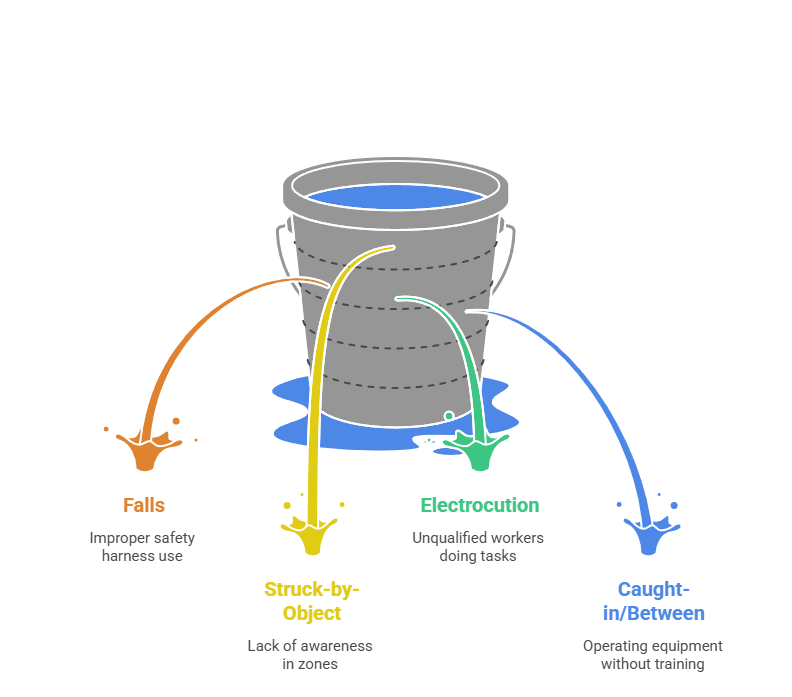
- Falls: Account for over 36% of construction deaths, often involving improper safety harness use or failure to follow fall protection protocols
- Struck-by-Object: Represents 10% of fatalities when workers fail to maintain proper awareness in equipment operation zones
- Electrocution: Causes 8% of construction deaths, frequently involving unqualified workers performing electrical tasks
- Caught-in/Between: Results in 7% of fatalities when workers operate equipment without proper training or certification
Background checks that reveal patterns of reckless behavior, substance abuse, or violence indicators provide critical insights into whether candidates will follow safety protocols. These screening components help construction employers assess judgment and responsibility before placing workers in high-risk environments.
Regulatory Compliance Creates Legal Screening Obligations
Texas construction employers face overlapping federal and state regulations that mandate specific screening protocols. OSHA requires employers to ensure workers are qualified and properly trained for their assigned tasks. This applies particularly to equipment operation and hazardous material handling.
The Texas Department of Licensing and Regulation (TDLR) oversees various construction trades. Active licenses are required for electricians, plumbers, air conditioning contractors, and other specialized workers. Hiring unlicensed workers for regulated trades exposes construction companies to citations, fines, and project shutdown orders.
Federal contractors working on government projects must comply with additional screening requirements. These include E-Verify participation for employment eligibility verification and drug-free workplace policies. The Drug-Free Workplace Act applies to federal contractors with contracts exceeding $100,000, mandating comprehensive substance abuse programs that begin with pre-employment drug screening.
Insurance Requirements Drive Screening Standards
Commercial insurance carriers have dramatically increased their underwriting scrutiny of construction companies' hiring practices. This follows costly claims related to unqualified workers. General liability policies, commercial auto insurance, and workers' compensation coverage now routinely include provisions requiring documented background checks, drug screening, and license verification.
Insurance companies recognize that employers who skip screening steps experience significantly higher claim rates. A Texas general contractor's commercial auto policy may specifically require MVR checks for anyone operating company vehicles. Violations such as DUI convictions create coverage exclusions that leave companies financially exposed if accidents occur involving unscreened employees.
Essential Components of Texas Construction Employment Screening
Effective construction industry screening programs incorporate multiple verification layers. These address safety risks, regulatory compliance, and operational competency. A comprehensive approach protects construction companies from liability while ensuring qualified workers perform specialized tasks.
Criminal Background Checks for Construction Workers
Criminal history screening serves multiple purposes in construction hiring. However, employers must navigate FCRA requirements and Texas-specific regulations carefully. The Fair Credit Reporting Act requires employers to obtain written authorization before conducting background checks and to follow adverse action procedures if information leads to hiring decisions.
Texas construction companies should focus on specific offense categories rather than implementing blanket policies that reject all applicants with criminal records:
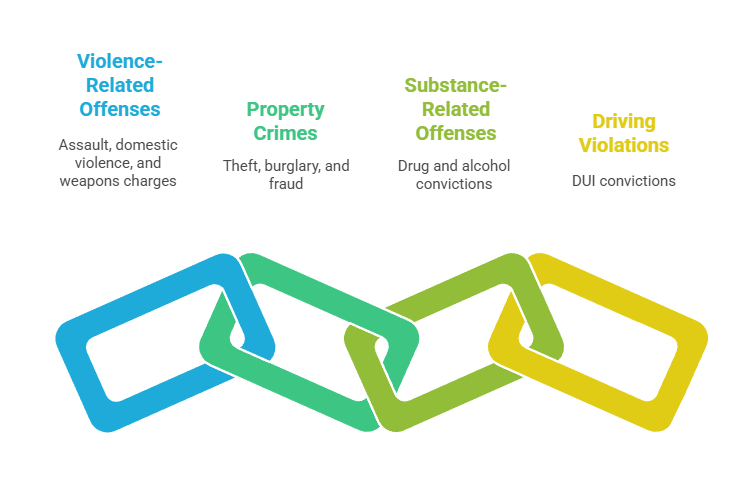
- Violence-Related Offenses: Assault, domestic violence, and weapons charges raise legitimate concerns in environments where workers operate dangerous equipment
- Property Crimes: Theft, burglary, and fraud signal risks for construction sites containing valuable materials, tools, and equipment
- Substance-Related Offenses: Drug and alcohol convictions deserve careful consideration given the safety-critical nature of construction work
- Driving Violations: DUI convictions indicate judgment issues that extend beyond vehicle operation to overall workplace safety
The Equal Employment Opportunity Commission (EEOC) guidelines require individualized assessments. Employers must consider the nature of the offense, time elapsed since conviction, and relevance to the specific position. Texas construction employers should document their decision-making process, demonstrating job-related reasons for any adverse action based on criminal history.
License and Certification Verification
Construction trades in Texas operate under state licensing requirements that employers must verify before assigning workers to regulated tasks. The Texas Department of Licensing and Regulation maintains online verification systems for electricians, plumbers, air conditioning contractors, and other licensed trades.
| License Type | Verification Source | Renewal Frequency |
| Master Electrician | TDLR Online Database | Annual |
| Journeyman Plumber | TDLR License Search | Annual |
| HVAC Contractor | TDLR Verification System | Annual |
| Elevator Inspector | TDLR Credential Portal | Annual |
Beyond state-issued trade licenses, construction employers should verify industry certifications relevant to specialized equipment and safety functions. OSHA requires certification for specific tasks including forklift operation, scaffold erection, crane operation, and confined space entry. Professional certifications from organizations like the National Center for Construction Education and Research (NCCER) indicate workers have completed standardized training programs recognized throughout the construction industry.
Motor Vehicle Records Checks
MVR screening protects Texas construction companies from negligent hiring liability and ensures compliance with commercial auto insurance requirements. Any position involving operation of company vehicles requires MVR review as a standard screening component. Traffic violations provide insights into judgment, responsibility, and safety awareness that directly relate to construction work performance.
Serious violations including DUI/DWI convictions, reckless driving, or patterns of at-fault accidents indicate behavioral risks. A worker who demonstrates poor judgment on the road may similarly disregard safety protocols on construction sites. Texas construction companies should establish clear MVR standards, typically rejecting candidates with recent DUI convictions, suspended licenses, or multiple serious violations within specified timeframes.
Drug and Alcohol Screening Programs
Substance abuse screening remains non-negotiable for Texas construction employers. Safety risks, insurance requirements, and federal contractor obligations make this essential. Pre-employment drug testing establishes baseline expectations and identifies candidates with active substance abuse issues before they enter the workforce.
The Department of Transportation requires specific drug testing protocols for CDL holders. These mandate 5-panel tests using certified laboratories and following strict chain-of-custody procedures. Non-DOT construction workers typically undergo similar testing, though employers have flexibility in panel selection and procedures.
Beyond pre-employment testing, comprehensive programs include multiple components:
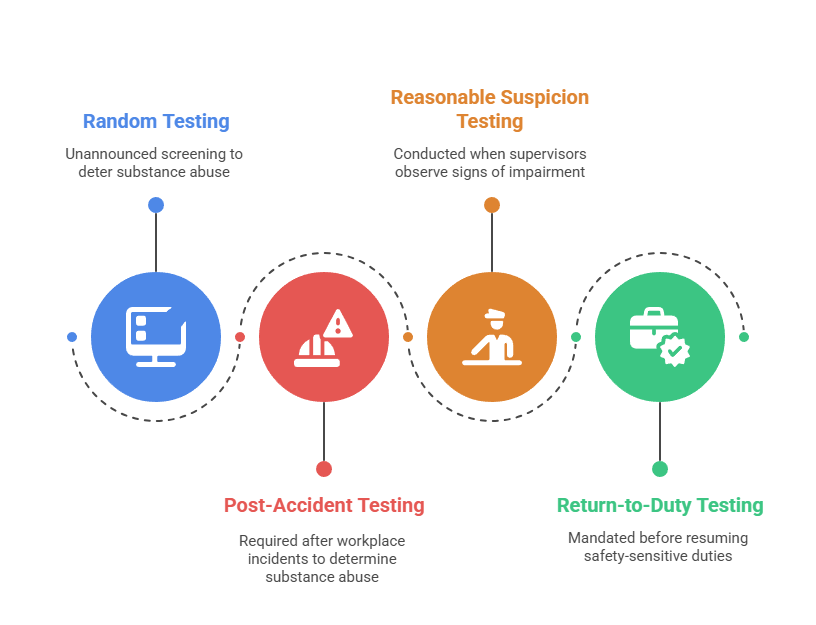
- Random Testing: Unannounced screening of a percentage of the workforce maintains deterrent effect
- Post-Accident Testing: Required after workplace incidents to determine if substance abuse contributed to accidents
- Reasonable Suspicion Testing: Conducted when supervisors observe behavior or physical symptoms suggesting impairment
- Return-to-Duty Testing: Mandated before workers resume safety-sensitive duties following positive tests
A well-designed substance abuse policy balances safety protection with employee rights. It clearly communicates testing circumstances and consequences while offering resources for workers seeking help with addiction issues.
Texas-Specific Construction Compliance Requirements
Texas construction employers must navigate state-specific regulations that create unique screening and verification obligations. Understanding these Texas-focused compliance areas prevents costly violations and demonstrates commitment to regulatory adherence.
Texas Workers' Compensation and Background Screening
Texas remains the only state where private employers can opt out of workers' compensation coverage. However, most construction companies maintain coverage due to contractual requirements and liability protection benefits. Insurance carriers offering workers' compensation to construction employers increasingly require documented screening protocols as underwriting conditions.
Texas construction companies should verify that their screening procedures meet workers' compensation carrier specifications. These may include specific background check components, drug testing requirements, and documentation retention periods. Failing to follow carrier-mandated screening protocols can result in coverage disputes if injured workers have criminal histories, substance abuse issues, or falsified credentials that weren't identified during hiring.
Texas Department of Insurance Construction Requirements
Construction companies working in Texas must comply with Department of Insurance regulations affecting both workers' compensation and general liability coverage. Licensed contractors bidding on projects valued over $20,000 must provide proof of workers' compensation insurance or documented exemption status.
| Requirement | Project Threshold | Verification Method |
| Workers' Comp Insurance | Over $20,000 | Certificate of Coverage |
| General Liability Coverage | Varies by Contract | COI Documentation |
| Subcontractor Insurance Verification | All Subcontracted Work | Direct Carrier Confirmation |
The Texas Department of Insurance mandates specific safety training requirements for certain construction activities. Employers must verify that workers have completed required training before assignment to covered tasks. Documentation of training completion, certification verification, and ongoing safety education should integrate with overall employment screening systems to ensure comprehensive compliance tracking.
FCRA Compliance in Construction Background Screening
The Fair Credit Reporting Act establishes federal requirements that Texas construction employers must follow when using consumer reports for employment decisions. Construction companies often struggle with FCRA compliance due to decentralized hiring practices, rapid hiring needs during peak seasons, and limited HR infrastructure at smaller contractors.
Authorization and Disclosure Requirements
FCRA requires employers to provide clear disclosure that a background check will be conducted. Employers must obtain written authorization before ordering consumer reports. The disclosure must be a standalone document, not buried within employment applications or other hiring paperwork.
Many construction companies make compliance errors by incorporating background check authorization within multi-page application packets. FCRA's standalone disclosure requirement means the authorization cannot include liability waivers, employment-at-will statements, or other non-disclosure content. Using compliant forms from the outset prevents technical violations that plaintiffs' attorneys aggressively pursue in class-action lawsuits targeting employers' screening practices.
Adverse Action Procedures
When background check information leads to hiring decisions adverse to applicants, FCRA mandates specific notice procedures. The pre-adverse action process requires employers to provide applicants with a copy of the consumer report, a written explanation of FCRA rights, and reasonable time to dispute inaccurate information. Texas construction employers rushing to fill positions often shortcut this waiting period, creating FCRA violations.
After providing pre-adverse action notice and allowing reasonable time for dispute (typically 5-7 business days), employers must provide final adverse action notice. This communication must inform applicants of the decision, identify the background screening company, and remind applicants of their right to dispute report accuracy. Construction companies should document compliance with each procedural step.
Individualized Assessment Requirements
EEOC guidance requires employers to conduct individualized assessments when criminal history information influences hiring decisions. This prevents blanket exclusion policies that may create disparate impact discrimination. Texas construction employers should evaluate the nature and gravity of offenses, time elapsed since conviction, and relationship between criminal conduct and the specific job position.
A conviction for embezzlement has clear relevance for positions involving financial responsibilities but limited connection to equipment operator roles. Conversely, substance abuse convictions directly relate to safety-sensitive construction positions where impairment creates serious risks. Employers should document their assessment process, explaining job-related reasons for decisions and demonstrating consideration of rehabilitative efforts and employment history since conviction.
Best Practices for Construction Industry Background Screening
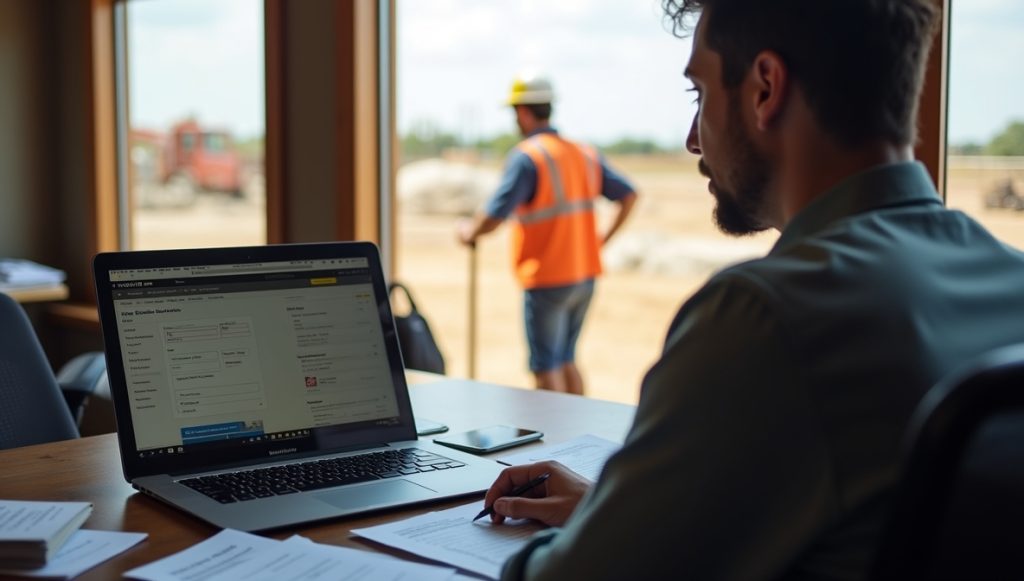
Successful Texas construction employers implement systematic screening programs that balance thoroughness with efficiency. These programs protect companies while respecting candidates' rights and maintaining hiring velocity.
Develop Position-Specific Screening Protocols
Not all construction positions carry identical risks or regulatory requirements. Administrative staff, equipment operators, project managers, and general laborers require different screening components based on job responsibilities, safety implications, and compliance obligations.
Texas construction companies should create screening matrices that specify which checks apply to different position categories:
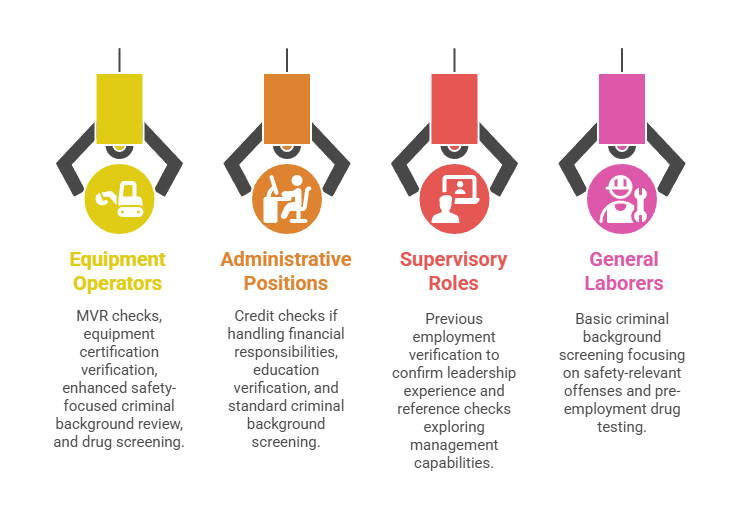
- Equipment Operators: MVR checks, equipment certification verification, enhanced safety-focused criminal background review, and drug screening
- Administrative Positions: Credit checks if handling financial responsibilities, education verification, and standard criminal background screening
- Supervisory Roles: Previous employment verification to confirm leadership experience and reference checks exploring management capabilities
- General Laborers: Basic criminal background screening focusing on safety-relevant offenses and pre-employment drug testing
Tailoring screening to position requirements reduces unnecessary costs while ensuring critical checks occur for safety-sensitive roles. This targeted approach also demonstrates job-related decision-making if screening practices face legal challenges.
Establish Clear Disqualification Criteria
Transparent screening standards help construction companies make consistent, defensible hiring decisions. Texas employers should document specific disqualifying factors for different offense categories, violation types, and timeframes. These written policies demonstrate job-related decision-making and provide defense against discrimination claims.
Sample disqualification criteria might include automatic rejection for DUI convictions within five years for positions requiring vehicle operation. Violent crime convictions within seven years might result in rejection for all positions. Drug-related offenses might lead to conditional offers requiring successful completion of pre-employment testing and agreement to random testing programs.
Maintain Ongoing Screening Programs
Pre-employment screening provides snapshot information about candidates' backgrounds at hiring time. However, workers' circumstances change during employment. Texas construction companies should implement post-hire screening programs that identify developing issues before they create workplace incidents.
Some construction employers conduct annual background check updates for positions involving significant trust or safety responsibilities. While FCRA applies to employment screening of current employees just as it does for applicants, ongoing programs help identify arrests, convictions, or license suspensions that may affect job fitness. These programs prove particularly valuable for construction companies working on government contracts or sensitive projects where security clearances and background verification requirements persist beyond initial hiring.
Cost-Benefit Analysis of Comprehensive Construction Screening
Texas construction companies sometimes view employment screening as an expense rather than an investment. However, the costs of inadequate screening far exceed the investment in proper verification programs when measured against accident liability, project delays, insurance impacts, and regulatory penalties.
Direct Costs of Hiring Unqualified Workers
A single workplace accident involving an improperly screened employee can generate costs that dwarf years of background screening expenses. OSHA citations for serious violations start at $14,502 per violation in 2025. Willful violations reach $145,027. Repeat violations carry enhanced penalties.
Beyond regulatory fines, construction companies face additional financial impacts:
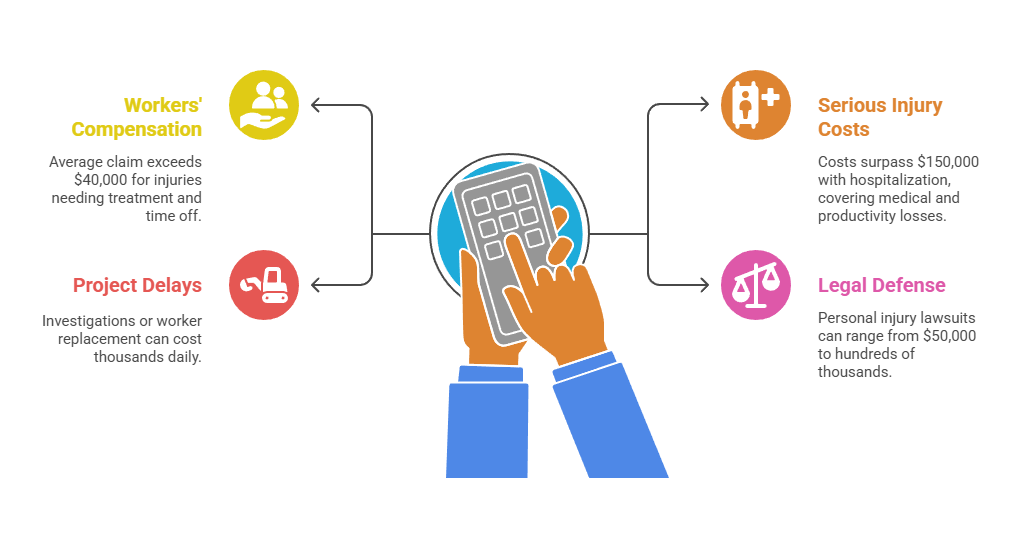
- Workers' Compensation Claims: Average over $40,000 for injuries requiring medical treatment and time away from work
- Serious Injury Costs: Exceed $150,000 when hospitalization is required, including medical expenses and productivity losses
- Project Delays: Cost thousands per day when investigations halt work or qualified replacement workers must be found
- Legal Defense: Ranges from $50,000 to several hundred thousand dollars for personal injury lawsuits
Construction companies that skip pre-employment screening to save $100-200 per hire risk catastrophic financial exposure. The cost-benefit calculation overwhelmingly favors comprehensive screening programs.
Insurance Premium Impacts
Insurance carriers price construction coverage based heavily on loss history and risk management practices. Employment screening programs directly influence premium calculations. Construction companies demonstrating comprehensive screening protocols receive preferential rates compared to contractors with minimal screening infrastructure.
| Screening Program Quality | Workers' Comp Rate Impact | General Liability Impact |
| Comprehensive Documentation | 15-25% of payroll | Standard market rates |
| Minimal Screening | 20-40% of payroll | 10-20% premium increase |
| No Formal Program | 40-100% of payroll | 25-50% premium increase |
Claims history creates even larger premium impacts. A single serious accident claim can increase workers' compensation premiums by 20-40% for multiple years. Multiple claims may result in coverage cancellation and forced placement in high-risk assigned pools where premiums can exceed 100% of payroll for certain job classifications.
Technology Solutions for Construction Employment Screening
Modern background screening technology enables Texas construction companies to implement efficient verification programs without creating administrative burdens. Digital solutions integrate with applicant tracking systems, provide mobile-friendly candidate experiences, and deliver results faster than traditional screening methods.
Integrated Screening Platforms
Leading employment screening providers offer platforms that centralize multiple verification components within single dashboards. These include criminal background checks, drug testing coordination, license verification, and reference checks. Integrated systems reduce administrative overhead compared to managing multiple vendor relationships for different screening elements.
Mobile-optimized platforms prove particularly valuable for construction hiring. Candidates may not have regular computer access but universally carry smartphones. Text-message-based candidate onboarding enables workers to complete authorization forms, receive drug testing instructions, and upload identification documents directly from phones. This mobile functionality accelerates time-to-hire, particularly important during peak construction seasons when delays in screening completion mean losing qualified candidates to competing employers.
Continuous Monitoring Services
Post-hire screening programs become manageable through continuous monitoring technology. These systems automatically alert employers when enrolled employees experience arrests, convictions, or license status changes. Rather than manually re-screening employees periodically, construction companies using monitoring services receive real-time notifications about developments affecting workforce safety and compliance.
Continuous monitoring proves especially valuable for construction companies maintaining drug-free workplace certification. The technology enables proactive response to developing issues, allowing employers to address problems before they create workplace incidents. Some monitoring services include MVR surveillance, alerting employers when commercial drivers accumulate violations or lose driving privileges.
Conclusion
Texas construction industry employment screening demands specialized approaches that address unique safety risks, regulatory requirements, and liability exposures. Construction companies that invest in comprehensive screening programs protect themselves from preventable accidents, insurance disputes, regulatory violations, and reputation damage. The minimal per-hire investment in proper screening generates substantial returns through reduced accident rates, lower insurance premiums, improved compliance, and enhanced competitive positioning. As Texas continues experiencing construction growth in 2025 and beyond, employers who prioritize thorough employment screening will maintain the safest work environments and the strongest competitive advantages.
Frequently Asked Questions
What background checks are required for Texas construction workers?
Texas law doesn't mandate specific background checks for all construction workers, though OSHA requires employers to ensure workers are qualified for assigned tasks. Most construction companies conduct criminal background checks focusing on safety-relevant offenses, drug screening, MVR checks for equipment operators, and verification of required trade licenses. Federal contractors face additional requirements including E-Verify participation and drug-free workplace programs.
How far back do construction industry background checks go in Texas?
Criminal background checks in Texas typically report felony convictions indefinitely and misdemeanor convictions for seven years under FCRA guidelines. However, Texas criminal records have no statutory reporting limit for most employment purposes. Employers should focus on offense relevance and consider EEOC guidance requiring individualized assessment rather than relying solely on reporting timeframes.
Can Texas construction companies reject applicants based on criminal history?
Yes, Texas construction employers can make hiring decisions based on criminal history when offenses relate to job responsibilities and present legitimate safety concerns. However, they must follow FCRA adverse action procedures and conduct individualized assessments as EEOC guidelines recommend. Blanket policies automatically disqualifying all applicants with any criminal record may create discriminatory impact.
What licenses must Texas construction workers have?
Texas requires state licenses for specific trades including electricians, plumbers, air conditioning contractors, and certain other specializations regulated by TDLR. Equipment operators need proper certifications for forklifts, cranes, scaffolding, and other specialized machinery. Construction employers must verify that workers possess required licenses before assigning them to regulated tasks, with violations resulting in citations and fines.
How do drug testing requirements differ for Texas construction companies?
Federal contractors must implement drug-free workplace programs including pre-employment testing, while DOT-regulated workers face specific 5-panel testing requirements under FMCSA rules. Non-federal construction employers have flexibility in drug testing policies but face strong incentives from insurance carriers to implement comprehensive programs. Most Texas construction companies conduct pre-employment testing as standard practice.
What is the average cost of employment screening for construction workers?
Basic construction worker screening including criminal background check and drug testing typically costs $75-150 per candidate. Comprehensive programs adding MVR checks, license verification, and employment history cost $150-300 depending on position requirements. These costs represent minimal investment compared to potential accident liability, insurance impacts, and regulatory penalties associated with inadequate screening.
Do Texas construction companies need consent for background checks?
Yes, FCRA requires employers to provide standalone written disclosure that background checks will occur and obtain applicants' written authorization before conducting consumer reports. Texas construction companies must follow specific adverse action procedures if background information leads to negative hiring decisions. Proper documentation of consent and notification procedures prevents FCRA violation claims.
How quickly can construction employment screening be completed?
Criminal background checks typically return results within 1-3 business days for most Texas counties. Drug testing results are usually available within 24-48 hours for negative results, with positive results requiring additional confirmation testing extending timeframes to 3-5 days. License verification and MVR checks often complete within 1-2 business days. Comprehensive screening programs typically require 3-7 business days total.
Additional Resources
- Texas Department of Licensing and Regulation - Verify a License
https://www.tdlr.texas.gov/LicenseSearch/ - OSHA Construction Industry Safety Standards
https://www.osha.gov/construction - Federal Trade Commission - Using Consumer Reports for Employment Purposes
https://www.ftc.gov/business-guidance/resources/using-consumer-reports-what-employers-need-know - EEOC Enforcement Guidance on Criminal Records
https://www.eeoc.gov/laws/guidance/arrest-and-conviction-records - Texas Department of Insurance - Workers' Compensation
https://www.tdi.texas.gov/wc/index.html - FMCSA Drug and Alcohol Clearinghouse
https://clearinghouse.fmcsa.dot.gov/
Still have questions?
Get in touch with our team today for a personalized demo and discover how our tailored volume pricing and packages can drive results for your business!
How useful was this page?*
Note: your comments are anonymous. We use them to improve the website. Do not include any personal details.
Visit our FCRA Compliance Tool or leave a message here if you need a response.
From the blog Explore the GCheck Content Hub

How Long Does a Background Check Take? A Complete 2025 Guide
13 Dec, 2023 • 14 min read
The Ultimate Background Check Guide
13 Dec, 2023 • 4 min read
The Ultimate Guide to Employment Background Checks
13 Dec, 2023 • 10 min readThe information provided in this article is for general informational and educational purposes only and should not be construed as legal advice or a substitute for consultation with qualified legal counsel. While we strive to ensure accuracy, employment screening laws and regulations—including but not limited to the Fair Credit Reporting Act (FCRA), Equal Employment Opportunity Commission (EEOC) guidelines, state and local ban-the-box laws, industry-specific requirements, and other applicable federal, state, and local statutes—are subject to frequent changes, varying interpretations, and jurisdiction-specific applications that may affect their implementation in your organization. Employers and screening decision-makers are solely responsible for ensuring their background check policies, procedures, and practices comply with all applicable laws and regulations relevant to their specific industry, location, and circumstances. We strongly recommend consulting with qualified employment law attorneys and compliance professionals before making hiring, tenant screening, or other decisions based on background check information.

